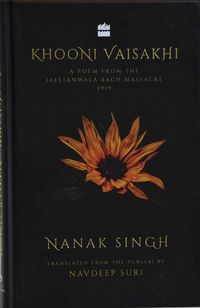The Jallianwallah Bagh massacre changed India. But Hardeep Puri, the union minister for urban development and Navdeep Suri, India’s ambassador to the UAE, have a more personal connection—both their grandfathers were survivors of the massacre a 100 years ago.
Puri’s grandfather, managed to jump over the wall when the firing started. He lived with a limp for the rest of his life. Suri’s grandfather, Nanak Singh, lost two of his friends, was buried under a pile of corpses and lost his hearing in his left ear. Singh, an eyewitness to the bloodiest massacre during the Raj in the subcontinent, wrote a poem 'Khooni Vaisakhi'. A bone-chilling account of what happened that day, it has been translated into English for the first time by his grandson Suri. Befittingly, Puri will launch the translation of the poem, which has been published by Harper Collins India, in Delhi on Saturday.
The poem was banned in 1920 by the British. Every copy was seized and in his life time, Nanak Singh, who rose to become Punjab’s greatest writers of all times, never saw it again. Or read it. Nor had the family. Singh never spoke of the event or the poem much. “I was talking to our friend who is a psychiatrist who said it isn’t uncommon to go into denial and try and block out the unpleasant. I don’t want to over analyse,’’ says Suri. He also felt that Singh over the years had lived through so many momentous events from Partition—which he writes extensively about—and the 1965 war, that this might just have been another episode. “A blip,’’ he says.
In the 1980s, the poem was discovered by accident by a lecturer who was a fan of Singh’s work in a bag of papers that his grandfather had left him. Singh’s son Kulwant Suri, was a publisher and he printed it. “I don’t think even the family the appreciated the singularity of it,’’ says Suri. This is not the first time that Suri has translated his grandfather’s works into English. There have been two novels before, with a lot of “nudging’’ he admits by his mother. “This one I was quick to seize the significance. I realised you have to share it with the larger public. It is almost indecent that something of this significance should remain confined to a handful of people who can read Gurmukhi. And even in that shrinking universe, how many will read it?’’
A powerful poem, Nanak Singh starts it with an invocation to Guru Gobind Singh, the warrior Guru and goes on to narrate an event that he feels people should remember. From the horrors of the firing to the aftermath when people were begging for water, Singh’s poem leaves the reader with goosebumps. So, does he believe that there should be an apology? “I served in Australia, and I saw the Australians tie themselves in knots for years and years before they finally expressed their apology to the indigenous Australians. As a matter of practice, governments find it very hard to say sorry. The English language offers you a rich vocabulary of regret and shame and 'should not have happened' as alternate devices,’’ he says. “But I am arguing it is not important only for us. It is important for them. They took pride in a great civilisation and a great empire. This is one of the most egregious acts of violence that they committed on an unarmed population. Surely, they owe it to themselves, to improve their own position on this.’’
The message of Jallianwallah Bagh, Suri, believes is for India to remember. “Instead of getting fixated on that. Let us keep looking inward on what are the points that we need to do. And internalise some of the lessons of Jallianwallah Bagh. I think the message of respects between religions is an eternal one. Relevant in these times and the next times and the next times. The fact that we see so many young people who have no concept of Jallianwallah Bagh. I belong to Amritsar, and the number of people who have no clue. Hopefully, this centenary people will become a little wiser.’’



